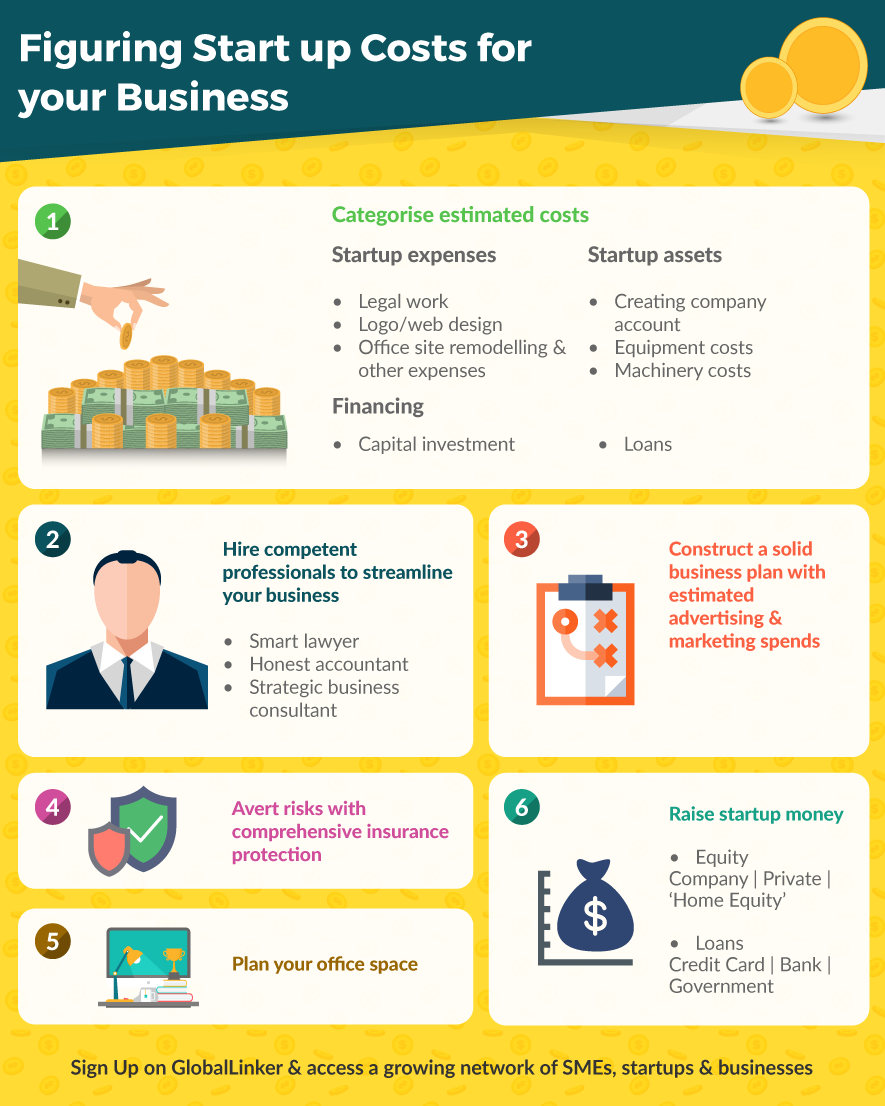Figuring Start Up Costs of Starting Up a Business

Business Development
563 week ago — 8 min read
There’s nothing more crucial than having a solid business plan for businesses starting from scratch. In order to get your venture started, you can benefit by answering this fundamental, if not most critical question of - How much money will I actually be spending?
You’d also have to account for expenses to combat for any probable anomalies or disruptions that can hamper your growth even before it starts.
The First Steps
After gaining an understanding of how feasible your business concept is, the first step is to roughly calculate the basic cost of setting up operations, which would be your one time or ‘start up’ expenses. Then, you need to assess the costs of managing your business on an ongoing basis, including the recurring expenses. The key is to look up the business expenses as individual components.
This will help in creating a list or outline to determine the amount of money that you would be spending on metrics such as – starting inventory, employees’ remuneration, office costs, equipment, marketing costs, legal fees, remodelling, cash, unanticipated expenses and others depending upon the manifesto of your business.
A quick categorisation could help you estimate your costs as -
- Start-up expenses -Typically this would account for expenses before you set out with your venture, or before the first month. For example, expenses incurred on legal work, logo/web design, office site, remodelling and other expenses.
- Start-up Assets – Here, the assets would be ‘cash’ in the form of money in your company account, and costs of starting inventory. Others could be equipment, furniture, machinery etc.
-
Financing – This includes both, capital investment and loans.
What else to consider in detail -
Hiring Professionals to Streamline Your Business
Apart from hiring the required work force, there are three important employees you can’t ignore – a smart lawyer, an honest accountant, and a strategic business consultant. While the role of an accountant would essentially revolve around maintenance of financial records, he would be rated upon his efficiency in reducing start-up and operational costs of the business.
To stand stiff against legal complications that might arise in the course of your business, a legal advisor or lawyer is a must. His role would not be restricted to rendering legal advisory services, but also placing the company in a safer position against different kinds of legal baffles.
When it comes to strategising your business, then a business consultant would come into play, who would recommend cohesive strategies to accentuate the business opportunities. A consultant can also conduct research for the client to align the company with best practices in the industry, thereby positively impacting the top and bottom line growth of the business.
Constructing a Solid Business Plan with Estimated Advertising & Marketing Spends
Small business entrepreneurs often make a mistake of thinking that whatever is left over can be used in marketing and advertising, however, this philosophy does not hold true in the current context. You can play the game with more modest budgets if coupled with some smart thinking, such as professionally designed business cards and website that don’t cost much.
Another smart marketing trick is giving free samples of your service or products to clients who might want to try the offer, like it and eventually give business to the company. Also, monthly magazines at times have unsold spaces towards the month end, and these could be taken up at discounted prices.
Avert Risk with Insurance Protection
While taking an insurance cover, make sure that you don’t end up wasting more money on just one type of insurance. Look instead at one company meeting several insurance needs at a lesser price. While this can be a good way to save money, another way could be to become a member of an industry or association that can provide a homogenous pool for both personal and business insurance needs, such as property, medical, life and liability insurance services.
Planning your Office Space
The costs associates with your physical space would probably be the biggest. You need to account for expenses incurred for equipment and facility leases before starting out. If possible, the fixtures and equipment could be financed on a long-term basis. Installing, decorating, or remodelling fees can be bought down by inviting bids from different contractors. Furthermore, office supplies and signage costs must also be included.
Raising Start-Up Money
There are several ways through which you can raise money for your start-up. While banks and lenders never lend 100% of the total funds needed, you might have to self-route one-third of the amount required. However, one thing to note is that every business person should consider any kind of lending amount as a loan amount, and have it in ‘Writing’, even if it is sourced from friends. The document should list the conditions of both raising and returning of funds from the lender, which would further substantiate as a loan record or proof for the prospective client or buyer who want to invest in a credible business firm.
Another way to raise money is through equity which comes in the form of private investments from companies who are interested to invest in the form of stakes in the enterprise. Companies or friends can invest in the business, and in return pick up an ownership in the company. However, you need to be careful that the partner entrusted with this role is reliable.
In case you own a house, and are looking for a way to raise a loan for business, then an option available is applying for loan through ‘Home Equity’, which would use your home as a security for the loan amount being raised. An added advantage that home equity brings with it is that the entrepreneur can also enjoy certain tax rebates such as writing off interest expenditure as business expenditure.
Credit Card loan is certainly an option, but not a very feasible one, especially for those who are not willing to pay high interest rates. However, you can use a charge card to pay for certain products and services and defer the payment at no interest cost by paying the full amount at the end of the month. If you think that you would not be able to manage the business and funding, then sharing your burden and loan is another possibility that can be explored. However, this would imply that you will have to share profits and losses with your partner depending upon the stake in the firm.
Bank loans are another viable option for small businesses that want to take loans against some collateral and can convince the lender about the repayment of the loan. One can check for the best available rates in the banks, and apply accordingly.
Government loans, which requires going through a bank with the required paper work procedure. Even though government loans also require security against loan and charge higher fees, but they permit the loan for a longer term.
Setting up a business does not mean that you need to have deep pockets; rather a smart strategy can play the trick and lay the foundation for ramping up your business with a bright future ahead.

Posted by
GlobalLinker StaffWe are a team of experienced industry professionals committed to sharing our knowledge and skills with small & medium enterprises.
Network with SMEs mentioned in this article
View GlobalLinker 's profile
Other articles written by GlobalLinker Staff
How to List on GlobalLinker Marketplace: A Step-by-Step Guide for Sellers
26 Mar 2025, 12:01
How to Enable Checkout on GlobalLinker Marketplace: Guide for Sellers
26 Mar 2025, 12:01
Most read this week
Trending














Comments (2)
Share this content
Please login or Register to join the discussion